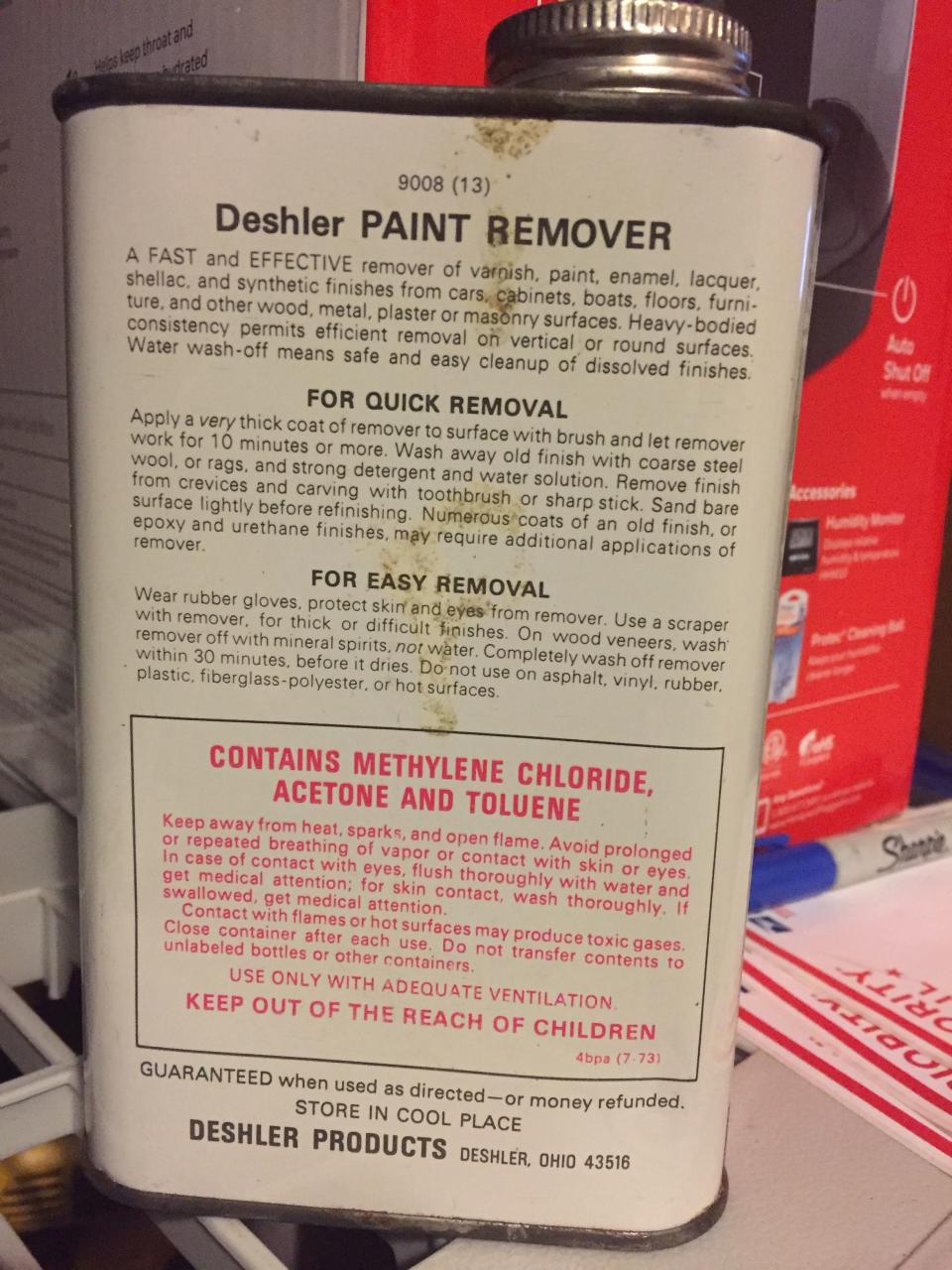EPA ban on popular toxic paint strippers: What to know

Numerous retailers promised to stop the sale of paint strippers containing methylene chloride even before this week's announcement by the U.S. Environmental Protection Agency of a ban on sales to consumers.
The chemicals, popular with do-it-yourselfers and professional paint strippers, stayed on the market during years of back-and-forth with federal regulators and pushback from chemical industry interests, who insist the products are safe to use with proper precautions.
The controversy surrounded paint strippers containing methylene chloride and N-methylpyrrolidone (NMP). Both have been cited as toxic by medical experts and consumer safety groups.
According to the national environmental health organization Safer Chemicals, Healthy Families, at least 64 people have died from acute exposure to methylene chloride since 1980.
The EPA's rule announced Friday only pertains to the sale of methylene chloride to consumers, and does not affect use in the workplace. Friday's rule also does not include NMP, an alternative for methylene chloride that medical experts say can cause birth defects and reproductive issues.
Here is what to know:
What do these chemicals do?
Methylene chloride
Dr. Ken Rosenman, chief of the Division of Occupational Medicine at Michigan State University, was part of a team that linked the deaths of at least 13 workers nationwide, and three in Michigan, to the use of the paint stripping chemical methylene chloride. The investigation reviewed deaths from 2000 leading up to the report's publication in 2012.
"The fact that they're sold does not mean they're safe," he said.
Rosenman said methylene chloride directly affects the brain and acts similarly to alcohol toxicity when someone drinks too much – but just a little of this chemical, can kill quickly. Methylene chloride in paint strippers can be inhaled as fumes breach the air and it can also be absorbed through the skin.
"Between those two ways, just a tablespoon is enough to kill you," he said,
A person might begin to feel a little dizzy or groggy. Rosenman said recognizing these symptoms aren't enough of a warning sign to protect users because a fatality can come quickly – even if somebody came rushing in to help.
In some documented cases, people were found collapsed with their heads down in the bathtub, past the point of revival. Rosenman warned that bathrooms aren't always well ventilated, even with a fan.
And rubber or vinyl gloves also won't do when it comes to methylene chloride, Rosenman said.
"Methylene chloride has such acute toxicity," he said. "You'd have to have these special gloves, and you have to have an air supply respirator. If you think about an undersea diver who's got that air house with those big suits, that's the kind of protective equipment."
N-methylpyrrolidone
NMP, on the other hand, does not kill quickly, but Rosenman said it has the potential to cause major reproductive complications and birth defects.
Pushback and lawsuits
Rosenman said chemical trade associations, like the Halogenated Solvents Industry Alliance, have defended the use of these products.
The HSIA published a 1998 white paper arguing that "methylene chloride does not pose a significant health risk to humans under normal conditions of occupational exposure and when products are used in accordance with manufacturer's instructions."
While the paper added that workplace activities and users should keep exposure "as low as is reasonably practicable," it also outlined its uses as a "highly desirable chemical for many applications."
Meanwhile, according to Chemical Watch, two lawsuits were filed this year against the EPA, backed by environmental and public health advocates, plus family members of victims whose deaths were linked to methylene chloride. Both lawsuits claimed the agency has been too slow to act.

Retailers take action
The Mind the Store Campaign has called on retailers to stop selling the products, and several have complied.
As of Friday, the following companies had already announced commitments to stop selling products that contained methylene chloride and NMP.
Menards.
Ace Hardware – phasing out by end of July, but according to Safer Chemicals, Healthy Families, some local stores are independently operated and may carry paint strippers from other distributors.
Amazon – effective March.
Home Hardware – as of this year.
Walmart – as of February.
Lowes – planned to be phased out by the end of 2018.
Sherwin-Williams – planned to be removed by the end of 2018.
Home Depot – planned to be phased out by the end of 2018.
Canadian Tire – planned to be phased out by the end of 2018.
AutoZone – planned to be discontinued in 2018, according to Bloomberg.
PPG – planned to be discontinued in 2018, according to Bloomberg.
Kelly-Moore Paint Co. – planned to be discontinued in 2018, according to Bloomberg.
Some manufacturers have also taken action on methylene chloride and NMP.
Dumond: Spokesman Paul Deniken told the Free Press the company stopped making products containing it several years ago, but added that one of their products, Peel Away 7, which contained NMP, is being discontinued and removed from retail shelves. Deniken added their three core paint strippers do not contain methylene chloride or NMP.
Savogran Company: President Mark Monique said they've reformulated all of their methylene chloride products, and the reformulated paint strippers also do not contain NMP.
However, Schade said one of the biggest manufacturers of products that contain these toxic chemicals is W.M. Barr, which makes Klean Strip Premium Stripper, a product that comes with a methylene chloride warning on its website. Schade said their campaign has sent the company a letter, but did not receive a response.
The Free Press has also reached out to W.M. Barr and Barr Brands International for comment.
Follow Aleanna Siacon on Twitter: @AleannaSiacon.
This article originally appeared on Detroit Free Press: EPA ban on popular toxic paint strippers: What to know

